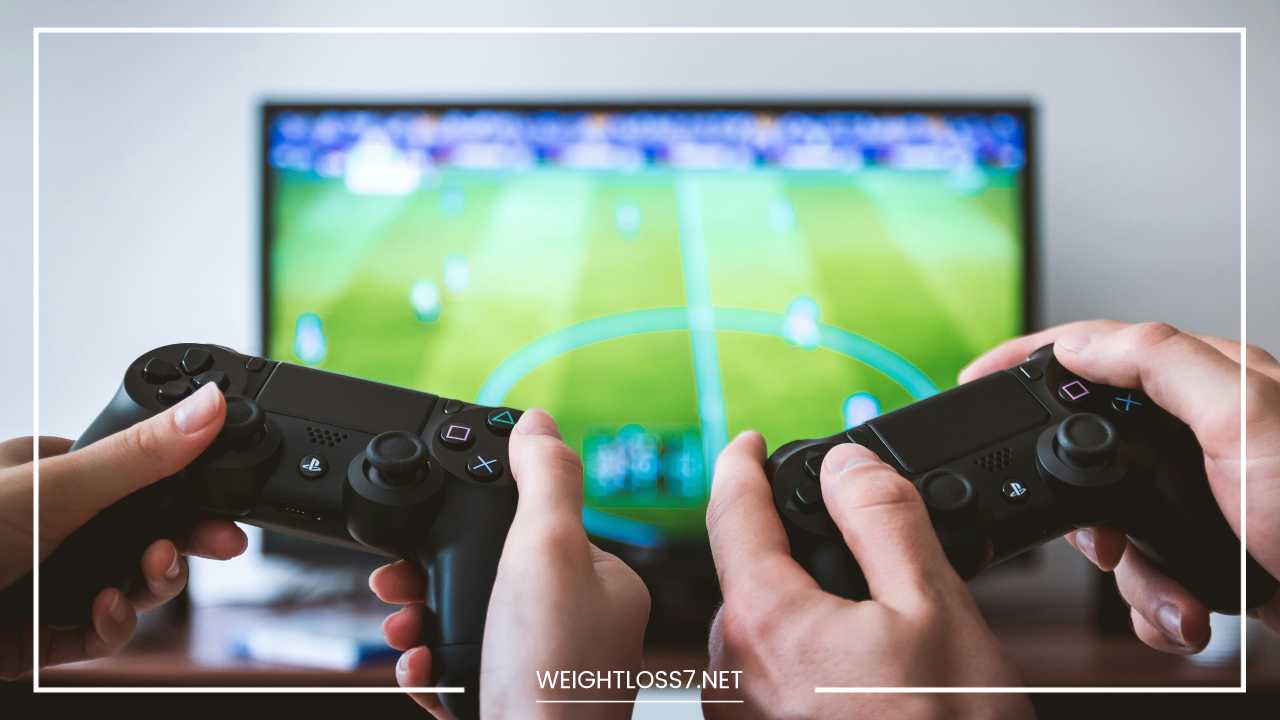Are Video Games Bad for You

Responsible Gaming
Are Video Games Bad for You? Debunking the Myths and Finding Balance
Video games have become interwoven into the fabric of our culture. From pixelated sprites to hyper-realistic avatars, they offer experiences that range from thrilling adventures to strategic battles.
But alongside their rise in popularity, a persistent question lingers: are video games bad for you?
The answer, as with most things in life, is far more nuanced than a simple yes or no. Video games can offer a multitude of benefits, from cognitive enhancements to social connection.
However, if left unchecked, they can also lead to negative consequences like health concerns and social isolation.
This article delves into the complex world of video games, exploring both their potential downsides and surprising upsides. We’ll then equip you with tools to navigate this landscape and cultivate a healthy relationship with gaming.
The Dark Side of Gaming: Debunking the Myths and Addressing Real Concerns
Let’s first address the common concerns associated with video games:
-
Health Concerns: Beyond the Couch Potato Stereotype: While excessive gaming can undoubtedly lead to a sedentary lifestyle, research suggests a more complex picture. Studies by the Mayo Clinic indicate that active video games, particularly those incorporating virtual reality (VR), can promote physical activity. However, moderation remains key. Encourage breaks for stretching, walking, or even incorporating elements of exercise into your gameplay (think dance games!).
-
Social Isolation: More Than Just Basement Dwellers: The stereotype of the friendless gamer is outdated. Online games foster a strong sense of community, with players collaborating towards shared goals and forming lasting friendships. However, it’s crucial to strike a balance. Ensure online interactions complement, not replace, real-world social connections.
-
Addiction: The Dopamine Dilemma: Video games can trigger the release of dopamine, a neurotransmitter associated with pleasure and reward. This can lead to addictive behaviors, prioritizing gaming over other aspects of life. However, it’s important to distinguish between healthy engagement and true addiction. If gaming is causing significant distress or interfering with daily functioning, it’s wise to seek professional help.
-
Impact on Mental Wellbeing: Violence Isn’t the Only Story: The link between violent video games and increased aggression has been a subject of much debate. While some studies suggest a correlation, others haven’t found a causal link. It’s likely a combination of factors, including pre-existing personality traits and real-world experiences, that influence how video games affect a person. However, it’s important to consider the content you consume. If a particular game is causing anxiety or negative emotions, take a break and choose something more relaxing.
The Bright Side of Gaming: Unlocking the Potential Benefits
Now, let’s explore the positive aspects of gaming that often get overshadowed:
-
Cognitive Boost: More Than Just Button Mashing: Strategy games and puzzles can significantly enhance problem-solving skills, critical thinking, and decision-making abilities. Fast-paced games like first-person shooters improve hand-eye coordination and reaction times. Studies by researchers at the University of Rochester even suggest that playing video games can enhance working memory and spatial reasoning.
-
Social Connection: Building Communities Beyond Borders: Online games can be a powerful tool for fostering teamwork, communication, and collaboration skills. Players develop strategies together, coordinate attacks, and learn to rely on each other to achieve victory. These skills translate well into real-world teamwork scenarios. Additionally, online games offer a platform for making new friends who share similar interests, especially for those who might struggle with social interaction in traditional settings.
-
Educational Value: Learning Doesn’t Have to Be a Chore: Educational games can make learning engaging and interactive, particularly for younger children. Games can be used to teach everything from history and science to language skills. Educational games can cater to different learning styles, making the process more enjoyable and effective for a wider range of students.
-
Stress Relief and Relaxation: Escaping the Daily Grind: Gaming can provide a fun escape from daily pressures. Immersive games can offer a sense of accomplishment and mastery, promoting relaxation and reducing stress. Studies by researchers at Hiroshima University of Economics have shown that playing video games can lower cortisol levels, a key stress hormone.
Cultivating a Healthy Relationship with Gaming: A Guide for Gamers of All Ages
So, how can you ensure a balanced and healthy relationship with video games? Here are some practical tips:
- Set Time Limits and Stick to Them: Establish clear boundaries for gaming time. Utilize timers, parental control settings, or apps that can help you track your gaming duration.
- Prioritize Other Activities: Don’t let gaming become all-consuming. Make time for exercise, spending time with loved ones, pursuing other hobbies, and fulfilling your obligations.
- Choose the Right Games: Be mindful of the content and ratings of video games. Opt for age-appropriate titles that align with your interests and goals. Consider the genre: Puzzle games can stimulate problem-solving skills, while narrative-driven adventures can foster empathy and emotional intelligence. Research the game’s content beforehand, especially if you’re concerned about violence, mature themes, or in-game purchases.
-
Maintain Physical Activity: Schedule regular breaks from gaming to stretch, move around, and get some fresh air. Aim for at least 30 minutes of moderate-intensity exercise most days of the week. Consider incorporating active video games into your routine, or use breaks to take a brisk walk or do some bodyweight exercises.
-
Promote Social Interaction: Encourage social interaction alongside gaming. Play with friends in person or online, or discuss the games you’re playing with others. Join online forums or communities dedicated to specific games to connect with like-minded individuals.
-
Open Communication: Maintain open communication with parents or guardians if you’re concerned about your gaming habits. Discuss healthy gaming practices and find ways to ensure these habits support a balanced lifestyle. If you’re a parent concerned about your child’s gaming habits, engage in open conversations about responsible gaming and prioritize activities that promote other valuable skills and interests.
-
Be Mindful of Microtransactions: Many games employ microtransactions, which allow players to purchase in-game items or features with real money. Set spending limits for yourself or your child to avoid excessive spending.
Beyond Balance: Exploring the Positive Impact of Gaming on Different Age Groups
The benefits of gaming can vary depending on your age and life stage:
- Children: Educational games can enhance cognitive development and motor skills. However, parents should prioritize playtime with physical activity and social interaction.
- Teenagers: Online games can foster a sense of belonging and community, especially for those who might struggle with social interaction in traditional settings. However, it’s important to monitor online interactions and ensure they remain positive and healthy.
- Adults: Gaming can provide a fun escape from daily stress and promote relaxation. Puzzle and strategy games can also help maintain cognitive function as we age.
- Seniors: Gaming can improve hand-eye coordination and reaction times, and can even be used for cognitive rehabilitation purposes. Social online games can also help combat loneliness and isolation, especially for seniors facing limited mobility.
The Future of Gaming: Embracing Emerging Technologies
The world of gaming is constantly evolving, with new technologies like virtual reality (VR) and augmented reality (AR) offering immersive experiences that transcend traditional gameplay.
These technologies have the potential to revolutionize education, training, and even physical therapy. However, it’s important to be mindful of potential drawbacks, such as motion sickness and the need for ergonomic equipment to avoid physical strain.
Final Word: Finding Your Balance in the Gaming World
Video games have carved out a permanent space in our culture, offering a diverse and engaging entertainment experience for people of all ages.
By adopting responsible gaming practices and maintaining a balanced lifestyle, you can maximize the benefits of gaming and minimize the potential drawbacks.
Remember, gaming should be a source of enjoyment, not a source of stress or conflict. Here are some additional tips to keep in mind as you navigate the ever-expanding world of video games:
- Be a Critical Consumer: Approach video game content with a discerning eye. Video games can be powerful storytelling tools, but they can also contain in-game advertising and portrayals of violence or stereotypes that warrant discussion. Engage in conversations about the messages conveyed in the games you play, and be mindful of the potential influence on your perspectives.
- Embrace the Growth Mindset: Video games are full of challenges and opportunities to learn from mistakes. They can be a great platform for developing a growth mindset, emphasizing the value of persistence, effort, and overcoming obstacles. Don’t get discouraged by difficult levels; view them as opportunities to hone your skills and problem-solving abilities.
- Find Games that Align with Your Values: There’s a universe of video games out there, catering to a wide range of interests and values. Explore different genres and discover games that resonate with you. Do you care about environmental issues? There are games that promote sustainable practices. Are you passionate about social justice? There are games that tackle important social issues. Find games that not only entertain you but also inspire you and reflect the values you hold dear.
- The Power of Play for Everyone: Gaming isn’t just for kids! People of all ages can benefit from the joy and engagement that video games offer. Whether you’re looking for a mental workout with a strategy game, a relaxing escape with a simulation game, or a chance to connect with friends through online play, there’s a game out there waiting to be discovered. So, embrace the power of play, explore different genres, and rediscover the joy of learning and having fun through the world of video games.
By adopting these practices, you can cultivate a healthy relationship with gaming and unlock its full potential for entertainment, learning, and personal growth.
So, grab your controller, choose your game wisely, and have fun exploring the ever-evolving world of video games!

















